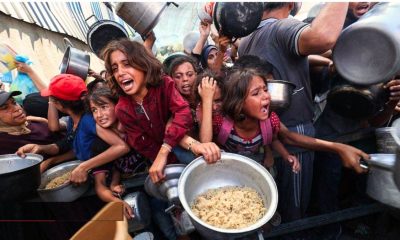World News
Israel Kills Over 80 in Gaza as Hunger Crisis Sparks Outrage

More than 80 people have been killed in Gaza amid worsening hunger conditions. According to Gaza’s health authorities, at least 14 Palestinians, including two children, died from malnutrition within 24 hours.
Since Israel launched its military campaign in Gaza in October 2023, the total number of malnutrition-related deaths has reached 147, including 88 children.
Most of these deaths have occurred recently, as the ongoing blockade has severely restricted the entry of humanitarian aid.
Israel imposed a full blockade on Gaza in March, which was partially eased in May. However, only limited aid has been allowed in since then, despite warnings from the United Nations and aid groups about the risk of mass starvation.
UNRWA, the UN agency for Palestinian refugees, described the situation as dire. Its Gaza staff have called the population “neither dead nor alive—walking corpses” due to starvation.
UNRWA’s head, Philippe Lazzarini, condemned the lack of action, saying: “Outrage and condemnation are no longer enough. There must be an immediate ceasefire, a reversal of starvation, and the release of all hostages.”
He emphasized that a ceasefire would allow for large-scale humanitarian aid.
U.S. President Donald Trump also highlighted the crisis, stating that many people in Gaza are starving and blaming Israel for the situation.
His comments contrasted with Israeli Prime Minister Benjamin Netanyahu, who claimed on Sunday there is “no starvation in Gaza” and vowed to continue fighting Hamas, which controls Gaza.
Netanyahu recently acknowledged the situation was “difficult” but assured that Israel is working with international partners to ensure aid reaches Gaza.
He said, “Israel will continue to work with international agencies, the US, and European nations to bring in humanitarian aid.”
During a visit to Scotland, Trump said that many people could be saved and announced plans to establish food centers in Gaza.
He promised that the U.S. would coordinate with other countries to provide more food and sanitation aid, with no fences or barriers to access.
Meanwhile, the Israeli military announced a temporary pause in some attacks and opened new corridors to facilitate humanitarian deliveries.
The United Nations welcomed the move but urged for increased aid shipments.
Al Jazeera’s Tareq Abu Azzoum reported from Deir el-Balah that Israel’s “humanitarian pauses” are limited and often only last a few hours in specific areas.
He noted they lack proper oversight and coordination with humanitarian agencies, raising concerns about their effectiveness.
Baby Formula Shortage Deepens Gaza Crisis
The worsening conditions in Gaza have sparked international criticism of Israel’s military actions. Aid groups warn that Gaza’s 2.3 million residents face mass starvation due to severe shortages of essential supplies, including baby formula.
Gaza’s Health Ministry reported 14 deaths from starvation and malnutrition in the past 24 hours.
An Al Jazeera’s medical source at al-Shifa Hospital in Gaza City told Al Jazeera that an infant named Muhammad Ibrahim Adas died from malnutrition caused by a lack of baby formula.
Gaza’s Government Media Office warned that the shortage of baby formula could lead to the slow death of tens of thousands of infants like Muhammad.
The office said there are over 40,000 infants under one year old in Gaza at risk of starvation due to the blockade, which Israel has maintained for 150 days, restricting the entry of vital supplies.
The office called for the immediate and unconditional opening of all crossings to allow the quick entry of baby formula and humanitarian aid.
As some aid trucks entered Gaza on Monday 28th July through the Kerem Shalom crossing and the Zikim road in the north, desperate Palestinians rushed to the trucks to take what supplies they could.
Al Jazeera’s Hind Khoudary reported from Deir el-Balah in central Gaza that Palestinians said they had no time to wait for food because their children have been starving for days and they see no other options.
This desperation highlights how badly Palestinians have been deprived of basic necessities. More aid trucks are expected to enter Gaza today.
The United Nations welcomed Israel’s decision to allow more aid in, but warned that restrictions still prevent enough supplies from reaching those in need.
Tom Fletcher, UN Undersecretary-General for Humanitarian Affairs, told Al Jazeera, “This is a step in the right direction, but we need much more aid at a much larger scale.”
Fletcher described current aid deliveries as “a drop in the ocean,” emphasizing that international law demands free access for aid, but ongoing security risks, closed crossings, visa rejections, and customs delays are blocking relief efforts.
Meanwhile, the hunger crisis persists amid ongoing Israeli military operations. On Monday, Israeli forces killed at least 88 Palestinians, including 40 who were seeking aid, according to medical sources.
Since late May, more than 1,000 Palestinians trying to access aid have been killed near distribution sites operated by the Gaza Humanitarian Foundation (GHF), which is supported by the US and Israel.
The GHF has faced heavy criticism from the UN and aid organizations for failing to deliver enough aid and for the dangerous security situation around its distribution centers.
Sources: Al Jazeera











